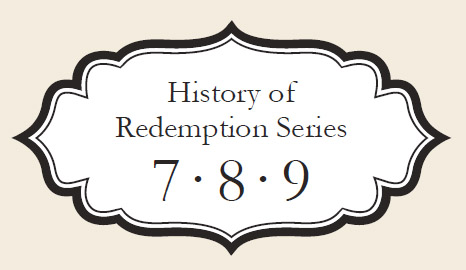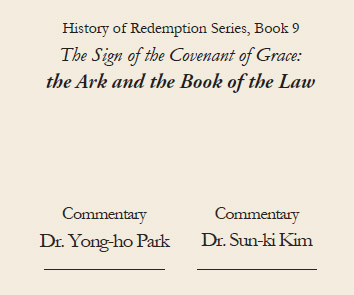|
|
Commentaries for The Sign of the Covenant of Grace: the Ark and the Book of the Law (Book 9)
|
|
|
글쓴이 :
관리자
|
|


A great piece of research with no parallel anywhere in the world
 Dr. Yong-ho Park Dr. Yong-ho Park
Former professor of Korean Bible College
President of Christian Literature Crusade (CLC)
There have been some books on the subject of the ark and the book of the law under the redemptivehistorical (historia salutis) perspective. However, this book is by far the greatest writing, distinguished from its predecessors, and is therefore a praiseworthy accomplishment for the theological society of Korea. This book features several novel characteristics.
First, this book’s discussion on the subject of the ark, the tabernacle and the book of the law is based on a thorough exposition and historical research on the original text. The author has breathed life into the seemingly boring contents in the Pentateuch and the Historical Books through etymological analysis of the Hebrew text. He also presents elaborate illustrations on the ark and the tabernacle based on parallel verses in the Bible and rabbinic literatures.
The ark was kept in the holy of holies, and Aaron’s budded rod, the two tablets of stone and a jar of manna were placed therein. No one knows exactly how or when these holy things were placed there; but Rev. Abraham Park has so astoundingly explicated these issues through the Bible.
Second, this book presents the migration history of the ark and the tabernacle in chronological perspective.
In Israelite history there was an unprecedented incident in which the ark was taken away. To this day, there hasn’t been any book that explained the course of the migration of the ark and tabernacle thereafter and how they were joined again in the temple of Solomon. The ark remained in Philistia for seven months, and then it was moved to the house of Abinadab and to Obed-edom before returning to a tent. The tabernacle was moved to Shiloh from Gilgal after entering Canaan, and then it was moved to Nob and Gibeon before finally returning to the temple of Solomon. Such a summary of the separation and migration history of the ark and the tabernacle is presented for the first time in world history and is therefore an amazing achievement in the world of theology.
Third, this book connects the history of the ark and the tabernacle to the history of the formation of the Bible. The ark was taken to Babylon in 586 BC when the southern kingdom of Judah fell and the temple was burnt down. But, the book of the covenant in which the Ten Commandments and the laws were written had been kept by the ark and was not lost even during the national fall. It was preserved by the Jewish people during their exile in Babylon and was returned to the Promised Land when they returned from the exile. It became the foundation for the preservation of the faith of the Israelites, God’s chosen people. Since then, more words from new revelations were progressively added to the book of the law, thereby assembling the complete 66 books of God’s Word that we have today. This book summarizes the entire history behind how the book of the law was delivered to us as the Bible and meticulously records the process of how God’s Word was preserved.
Fourth, this book studies the new temple of Ezekiel and the temple of Zerubbabel in great detail. In reality it is quite difficult to find a book with such detailed research on the new temple of Ezekiel and the temple of Zerubbabel. In particular, the new temple of Ezekiel is so complex in its measurement, arrangement and scale, such that even the Old Testament scholars avoid this subject. However, it is truly marvelous that an elderly pastor in Korea has reconstructed the new temple of Ezekiel solely based on the biblical text, precisely adhering to what had been intended by the original text in Hebrew. Even scholars who are experts on the temple of Ezekiel have only discovered a dozen or so locations within the temple that Ezekiel had seen in his vision; however, Rev. Park has researched and found twenty five locations from Ezekiel’s vision and has meticulously organized them in order for the readers. This is truly a precious research that is unprecedented anywhere in the world. As a great accomplishment for the church of Korea, it must be presented to the international world of theology.
In conclusion, this book interprets the human history from the perspective of the history of redemption, which has continued through the creation, the fall and the restoration. While discussing each part of the history, the author never loses scholarly precision and balance. This is why this book greatly assists not only the readers who accept the framework called redemptive history, but also every reader who desires to understand the biblical narratives and its context. This book teaches that the Bible is the Word of God and it is therefore so important. It testifies to the fact that the one who reads, hears and keeps the words of the Bible will be blessed. Through this book, the readers will see the law under a new light of Jesus Christ’s work which fulfilled and perfected all the laws, and discover the meaning of the law, the Word of God, in their personal journey of salvation (ordo salutis). Having confirmed that this book is a sincere research undertaken by a minister with scholarly depth and spiritual insight, I highly recommend this book to all churches around the world.

Overwhelmed by the majestic and blissful biblical exegesis
 Dr. Sun-ki Kim Dr. Sun-ki Kim
Former professor of the Naval Academy
Former professor of Korea Baptist Theological University/Seminary
Author of Petra Hebrew and Petra Greek
Current director of Petra Biblical Language Institute
After I finished reading this book, I was swept away by a tidal wave of emotions. The author was an unrivaled spiritual giant who had read the Bible, an unimaginable 1,800 times! The man exudes the Words of scripture from every part of his body. The scripture has completely been melted into his mind so that a gigantic waterfall of the Word overflows from within to produce a majestic and blissful exegesis of the Bible. Moreover, he has spent three years, six months, and seven days on the peak of Mt. Jiri sustained only by raw grains and leaves; it strikes the mind with the reminisces of the Apostle Paul’s wilderness prayer of three years in Arabia. From such a time of prayer the dynamic power of the Word that exudes from this man as rushes of molten lava are too much to bear; I was absolutely overwhelmed and overtaken. Especially striking was the author’s use of the original Hebrew and Greek, which was self-taught. I have been teaching the original biblical languages for thirty three years with over 1,000 lectures under my belt; and I could not hold back by amazement at the author’s skills. When one reads books or sermons that utilize original biblical languages, the reader comes away with the feeling that the author is using these languages to boast of his own linguistic skills, or one just can’t understand why such words were used at all. In the History of Redemption series, however, it felt as if I were reading the original text of the Bible directly; the tremendous power of the words contained therein was able to make one have such delusional thoughts. There are many men of God who read the Bible profusely, who pray incessantly; but I could only be amazed that such a man as the author exists today, one who freely and liberally utilizes the original text of the Bible through such deep, profound biblical research.
The contents about the ark and the migration of the tabernacle, and the recovery of the ark and the capture of Zion are extraordinary achievements which cannot be found in any other volume around. Especially in chapter three of this book, the section dealing with the golden jar containing the manna explains about the redemptive-historical meaning of the manna.
In that exposition, Jesus Christ is so vividly revealed that it was spectacular. Early on, I was moved to watch the movie titled The Passion of the Christ over five times. But the inspiration that I received from reading Rev. Park’s book was much more dynamic and powerful than what I got from the movie. In chapter five, the book deals with the postexilic temples and the history of the book of the law; and the book’s treatment of the temples of Ezekiel and Zerubbabel, and the book of the law was breathtaking. As someone who has had over thirty three years of original biblical language instruction experience, I wanted to take this time to introduce some excellent original language exegesis that was employed by the author in book nine of the History of Redemption series, The Sign of the Covenant of Grace: the Ark and the Book of the Law.
First, the ark in Hebrew is (aron). The word aron comes from the verb (ara) which means “to lead, to gather.”
In reality, the Israelites were gathered around the ark as they camped or set out. In the wilderness, the ark of the Lord went ahead of them to find a place of rest, and the Israelites would camp at that place. Here, the author uses Hebrew words to vividly explain the meaning and significance of the ark.
Secondly, the Apostle Paul exhorted the believers that if we desire to dwell in glory with Jesus Christ, then we should put to death the members of our body. “Put to death” in Colossians 3:5 (ESV) is Greek is (necrosate) used in the aorist, active imperative form signifying that one should resolutely mortify one’s body. This signifies a thorough repentance, contrition and brokenness of the spirit. Here, the author accurately exegetes the Greek aorist imperative to vividly bring out its meaning.
Thirdly, the command to store up the manna appears twice in Exodus 16:32-33. The author illuminates these two commands in verse 32 and 33 respectively from the Septuagint Greek. Verse 32 uses the verb (plesate, imperative second person plural) and thus is a command for all of the Israelites whereas verse 33 employs the verb (lambano, imperative second person singular) as a command given to Aaron alone. The author distinguishes these two commands and thus discovered that there are two regulations regarding the storage of manna. Fourthly, Deuteronomy 17:19 commands that the king make a copy of the book of the law and put it by his side all his days to read from it. Here, the word for “read” is (qara bo). This is a combination of the words qara which means to “to call out loud” and bo which menas “within.” Rather than meaning to read the law out loud, this actually means that one should inscribe the words of the law deep within one’s heart and actively meditate upon them. Thus, the king can examine himself at every moment through the law thereby fearing God more thoroughly than the people would; then he would be able to keep the words of the law and the commandments. Truly, if it were not the Hebrew original text, these are true meanings and essences of the text which we would not be able to taste and savor. The author has done well in his accurate exegesis as this.
As such, Rev. Park displays amazing Hebrew and Greek skills which are based on the Word. What’s important is the Word of God, not theology, scholarship or even religion. Our Lord said in John 6:63, “It is the Spirit who gives life; the flesh profits nothing; the words that I have spoken to you are spirit and are life.” Nowadays, we live in a veritable inundation of the Word. The countless numbers of Bible translations, the flood of sermons spewing forth from TVs and on the internet, the rush of publications like sermon collections, devotionals and theological treatises abound and yet, we still thirst and hunger for God’s Word. We are yearning for the living waters, and the living bread. The smorgasbord of seminaries and the plethora of doctors they put out each year, the “so-called” servants of God, are plentiful and yet this world is not being purified; rather, it is falling into more chaos and corruption. That is why we must proclaim the true Word of God and eagerly seek out the true man of God who teaches such true Words. I can only be grateful for the fact that I have met such a man through the History of Redemption series. Since I believe that the History of Redemption series is the clear, living water that can purify this corrupt world, and since I also believe that this is the bread of life that can satisfy the soul, I heartily recommend this book and the series to all the churches worldwide.

|
|
|
|
|
|

